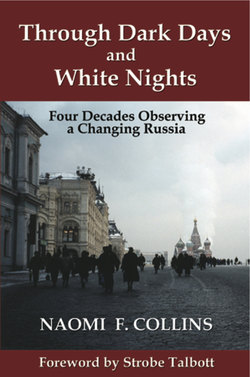Читать книгу Through Dark Days and White Nights: Four Decades Observing a Changing Russia - Naomi F. Collins - Страница 5
На сайте Литреса книга снята с продажи.
Foreword by Strobe Talbott
ОглавлениеRussia has come a long way from the Soviet era, but it is still a country as perplexing as it is important. In the decades I have spent visiting Russia as a journalist, diplomat, and policy analyst, I have come to appreciate books that provide useful insight into what has changed—and what hasn’t—in that giant country that straddles Europe and Asia, spanning eleven time zones. This book so qualifies. Through Dark Days and White Nights goes beyond an engaging memoir of life in Russia during an important period, from the 1960’s through the turn of the 21st century: it captures a sense of Russia as a work-in-progress. Rather than a musty snapshot of an earlier era, or an account of a short stay, the book is more like a script for a documentary spanning four decades when an especially astute and literate observer watched Russia emerge from stagnation and enter a period of dramatic economic, social, and political change and, on many fronts, upheaval.
Because of the scope of Naomi Collins’ experience with Russia, she is able to provide a sense of continuity in the development of a country whose daily life advanced from static to dramatic, yet retained enduring features that the author also discerns and describes with great skill and clarity. She recognizes how much of Russia’s past lives in its present, how long and dark a shadow the Soviet system casts over what we can now safely (if apprehensively) call “the Putin era.” She also has an acute eye and ear for Russian daily life; she understands and conveys how a talented but often beleaguered people have learned to buoy their spirits— including during periods of stagnation and upheaval—through an appreciation of the richness of their culture, the intensity of friendships, the natural beauty of their country, the rotation of the seasons, and the respite of holidays. The policies emanating from the Kremlin play their part in her story, but so do the pleasures of a weekend in the countryside and an Easter celebration. Her book is further enlivened by her self-awareness: she acknowledges how her own perspective has shifted and her reflections matured as her own life has progressed during a period of transformation in Russia’s.
That perspective began when she and her husband, Jim Collins, lived in a dormitory at Moscow State University in Lenin Hills in the mid-1960s; she returned with their two- and five-year-old sons a decade later, and again in the 1990s, when Jim—one of my closest friends and colleagues in the State Department—served as ambassador, resident in Spaso House, the splendid Italianate mansion in downtown Moscow.
A trained historian with a natural sense of how to tell a good and important story, Naomi has drawn from diaries, journals, letters, and travel notes written over the years to produce a remarkable book that appears at a time when Russia should be much more at the forefront of American’s attention than is now the case. It deserves an influential and respectful readership.
